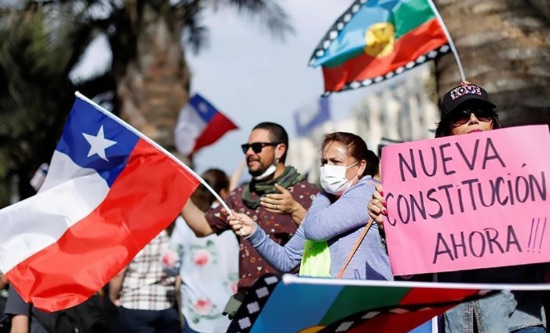
On 4 September Chileans voted against adopting a new Constitution to replace the current one written under the dictatorship of Augusto Pinochet in 1980. The new Constitution promised major social progress. Over 86% of the electorate turned out to vote: 62% rejected the document and only 38% approved it.
Pinochet’s 1980 Constitution imposed repressive measures as it set out to consolidate the military dictatorship, promote the free market and defend private property. Women’s right to abortion was banned outright. The vote for the Constitution was rigged: blank ballots were counted as ‘yes’ votes and thousands of Pinochet’s security forces voted numerous times.
There have been calls for a new Constitution for years, reaching prominence in the 2019 uprisings. A 4% hike in transport fares in Santiago, where almost one third of the Chilean population live, triggered national unrest. The hike came amidst years of deepening inequality. Beginning with school-aged young people jumping train barriers and then protests led by university students, hundreds of thousands of Chilean people poured onto streets around the country in protest.
In 2019, then-President Sebastian Pinera unleashed the violent carabinero police force which killed 36 people, injured 11,500 and detained over 28,000. The brutal violence did not deter protesters: the street movement was characterised by banging pots and pans, targeting statues of colonisers as symbols of imperialism and a relentlessness that was only slowed by the emergence of the coronavirus pandemic.
Protesters demanded billionaire President Pinera be removed, sovereignty and self-determination for indigenous peoples and a new Constitution. To save his own skin, Pinera had to concede to a vote on whether to rewrite the Constitution.
In November 2020, after various delays and cancellations, Chile finally held a plebiscite. It had two questions: whether to rewrite the Constitution; and who should rewrite it – a mix of directly-elected constituents and members of Parliament, or exclusively directly-elected constituents who would form a Constituent Assembly. 79% of voters voted for a Constituent Assembly to rewrite the Constitution.
From the start, Pinera ensured the process was fixed to protect the interests of imperialism and Chile’s comprador bourgeoisie. Any new Constitution was banned from ‘interference in international agreements’, ensuring the continuation of imperialist plunder of Chile’s natural resources. Under-18s, the section of the populace who had sparked the uprisings, were not allowed to vote. Members of social movements and trade unions were barred from standing for the Constituent Assembly.
In April 2021 Chileans voted to elect 154 representatives to the Assembly. The Assembly spent a year drafting a new Constitution. It was shared with the Chilean population in July 2022, followed by two months of debate and discussion before the vote on whether to accept it.
The document included the right to abortion and introduced gender equality measures. The Constitution would have made fighting the climate crisis a duty of the state, and made Chile a ‘plurinational, intercultural, regional and ecological’ state. Indigenous peoples would have been legally recognised, as would their rights to their land and resources.
Major concessions were made to the ruling class by agreeing to the limitations set out by Pinera in the constitutional process. Although those concessions meant nationalisation of Chile’s resources was ruled out, the proposed Constitution did include clauses that would have made opening new mining projects more difficult. Water would have been classed as ‘non appropriable’. It was enough to worry international finance capital: the editorial boards of the Financial Times and Washington Post wrote pieces anxiously denouncing the draft Constitution. US and British multinationals own and operate Chilean lithium and copper mines. The demand for lithium and copper is expected to grow exponentially over the coming years.
The Chilean ruling class had been forced to allow the vote on the Constitution, but it had also cleverly demobilised the street-based protest movement and channelled the anger into an electoral path that at each step of being stalled and delayed meant the movement lost more momentum. President Boric, elected in December 2021 with his credentials as an activist in the 2013 anti-government protests, was crucial in this process. Significant analysis is necessary to account for how a widely popular demand ended up being rejected en masse just two years later.
Since the new Constitution was rejected, the Pinochet-era Constitution remains in place. Boric is still committed to rewriting it – that is essential to quell any future mobilisations against it. But Boric has taken the responsibility of rewriting the Constitution out the hands of directly-elected citizens and passed responsibility to the Chilean Congress, representing forces from the far-right to the social democratic left. Boric has shown he is a safe pair of hands for Chile’s ruling class and a friend to imperialism. A fight for a Constitution in the interests of working class and indigenous Chileans will be dependent on those forces reorganising themselves outside the confines of parliamentarianism.
Ria Aibhilin
Fight Racism! Fight Imperialism! No 290, October/November 2022




